Read this roundup to catch up on AI and SEO. This summary of May’s top guides, data studies, and news headlines comes packed with 5 fresh items covering new AI systems and the changes they are bringing to search.
The first guide will introduce you to SGE—Google’s new AI search augment— and how it works. Then you’ll learn about some new recommended KPIs for content quality and find out how to seize the most low-hanging SEO opportunities on a tight budget.
The data studies are next. You’ll see the path one team took from 0 to 12,000,000 users in 2 years. Then, you’ll find out which brands are recommended by AI engines (and why), read a large-scale report on the state of search, and see the data for predictions that AI use will grow by 5x this year alone.
You’ll find news at the end. The latest headlines will tell you how to understand news topic authority, and how Google is introducing AI to its results.
If you prefer consuming video content, check this out.
Google Search Generative Experience: A Look at SGE With 12 AI Overviews
https://www.searchenginejournal.com/google-sge-ai-overview-examples/487918/
Kristi Hines provides you with this in-depth look at SGE (a new generative AI search aid that will augment normal Google searches). She provides multiple examples of how it will handle queries and provide results so that you can start to adjust your SEO.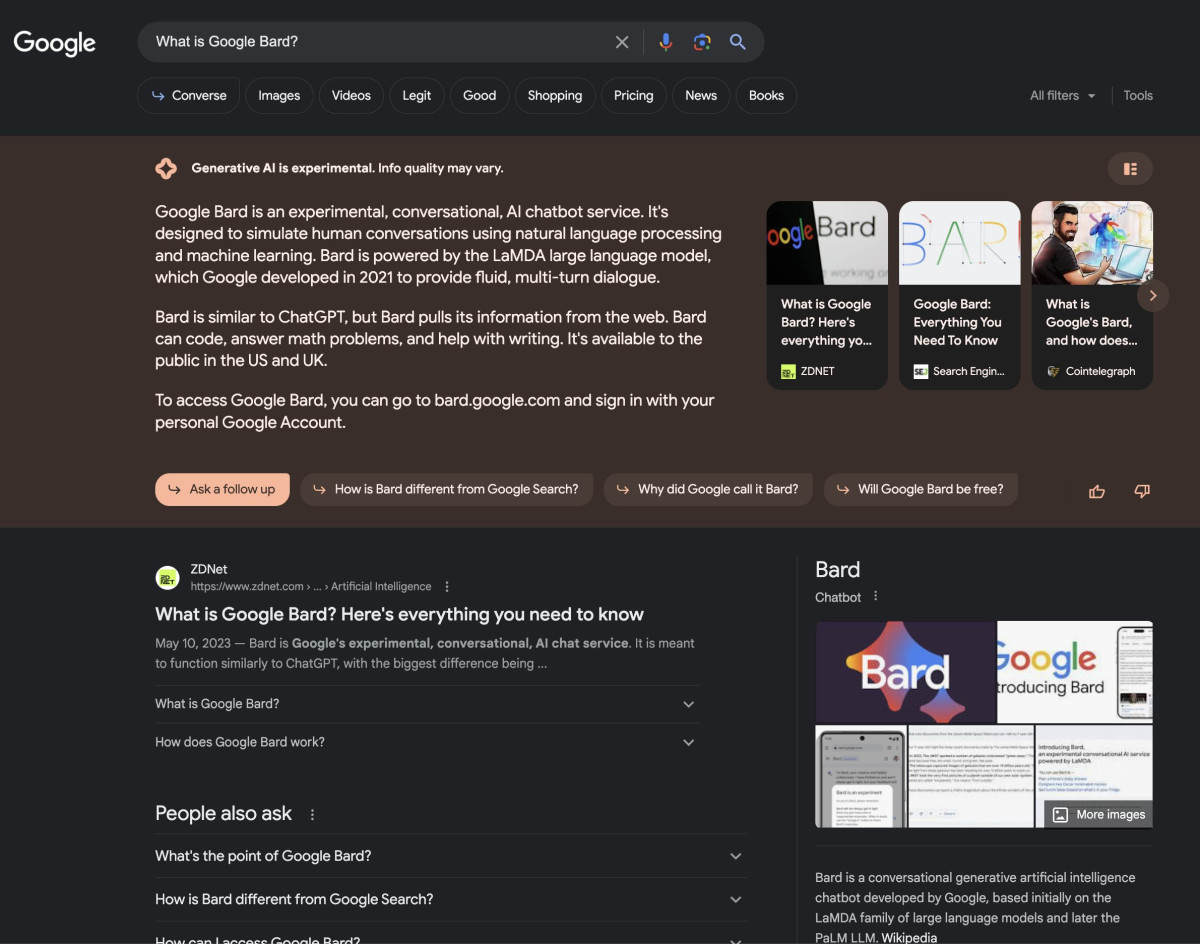
First, she lets you know how to join the partial rollout as a volunteer and start testing all these features for yourself. If you plan to wait until the full release, these examples will give you a good idea of what to expect.
These limited examples suggest that SGE works on slightly different principles than desktop and mobile search—at least enough to change the top winners. Make sure you check out the rest of the guide for the other examples and what they can tell you.
Ranking in any kind of search takes good content. In the next guide, you’ll get some advice for building better content with more updated KPIs.
Your New KPIs to Gauge Content Quality
https://sparktoro.com/blog/your-new-kpis-to-gauge-content-quality/
Amanda Natividad suggests you start building content with a new sort of approach. She claims that her development process isn’t meant to produce raw traffic but reliably delivers business results. In this guide, she introduces the KPIs she keeps for her process, what they mean, and how to capture them.
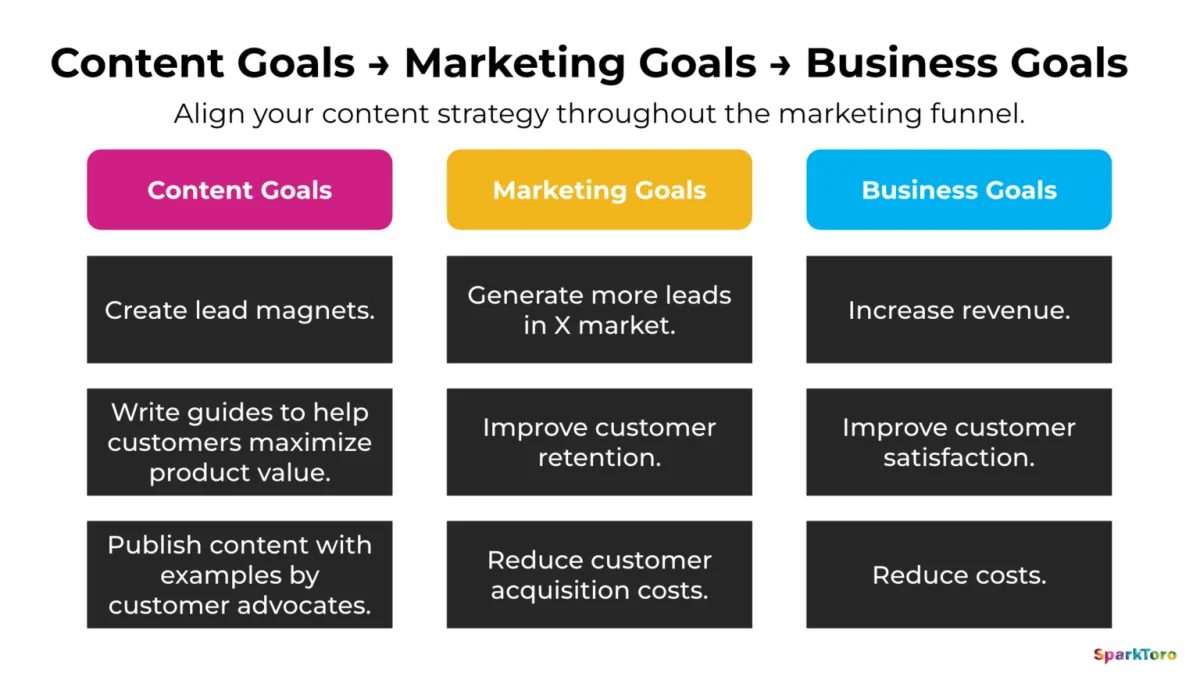
Among others, she recommends the following KPIs for content quality—
Check out the guide for a complete list of KPIs that prove your content is on the right track. Following KPIs like these can help you claim the credit you deserve for long-term or more abstract strategies.
Speaking of helping clients understand your value, the final guide of the month focuses on how you can reorder large SEO projects to start delivering for clients faster.
The Ultimate Low-Hanging Fruit SEO Strategy — Whiteboard Friday
https://moz.com/blog/low-hanging-fruit-seo-strategy-whiteboard-friday
Aleyda Solis brings you this guide to finding SEO’s “low-hanging fruit,” or in her words
—” those activities that will tend to have a higher output, a higher impact, and lower effort.”
She argues you should be tracking these opportunities from the start so you can use them to mitigate impatience from clients and stakeholders.
She recommends that you build a low-hanging fruit analysis alongside your typical SEO audit and use this analysis to develop your SEO schedule. When you identify needs that can be met with low-hanging fruit solutions, space them out so the client sees results for the entire project.
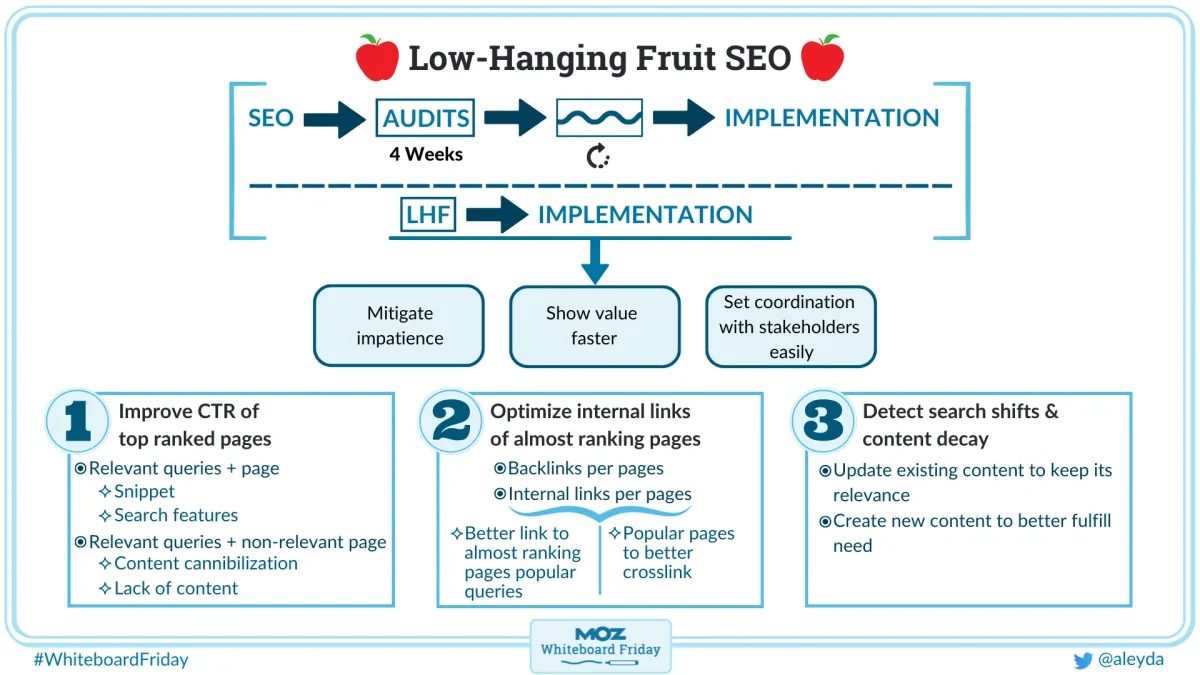
She provides some examples of solutions that may work for most types of projects, including—
Her complete guide (see the full video) includes a number of low-hanging targets and a flow chart to help you organize and prioritize them. She also has some extra advice on how you can start executing faster for clients.
That’s all the guides for the month. The case studies are next, starting with how one team hit 10m visitors in 2 years.
0 to 12,000,000 Users in 24 Months – Sleep Advisor Case Study
Nemanja Mirkovic brings you this analysis of the explosive growth of SleepAdvisor.org. This site project between Nemanja and a friend has been ongoing for 5 years. This study looked at a slice of two years when the site moved from no visitors to millions.
The analysis starts at the idea stage. Nemanja fully documents how he chose the niche, researched the competitors, and even chose the exact domain for SleepAdvisor.

From the start, he says, he focused on having content superior to what niche competitors were offering. He built and scaled high-quality content using an internal team. You’ll also get a lot of information about how he built his team and content process.
For the rest of the analysis, he describes how his team acquired backlinks for the site, developed content marketing for growth, and tested social media.
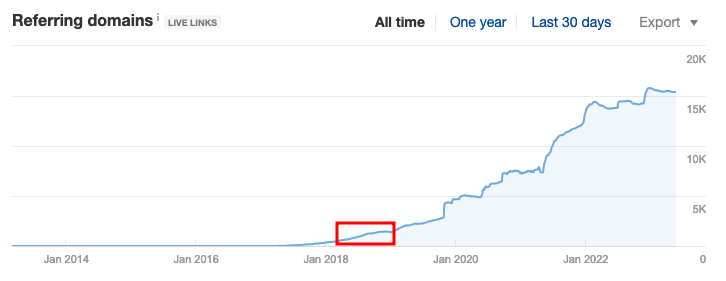
When traffic began to pour in, the team made the decision to focus on CRO. He provides examples of how CRO informed his process and how years of CRO testing have changed the presentation of his site.
He closes the analysis with all the ways the company successfully (and unsuccessfully) monetized the traffic it generated.
You’ll learn about how all of the following monetization attempts played out—
For the next data study, you’ll take another look at AI. These systems have been found to recommend brands when prompted. Is this an SEO opportunity?
Visibility in the AI Future: Which Brands are Recommended By OpenAI?
https://www.sistrix.com/blog/visibility-in-the-ai-future-which-brands-are-recommended-by-openai/
Johannes Beus brings you this exploration of what major generative artificial intelligence engines are recommending brands and how often.

This test was performed on OpenAI. The team gave the engine 10,000 product categories and asked it to return recommendations. This immediately yielded some interesting findings for the future of commercial search.
Johannes noted—
Johannes was also able to determine the most recommended out of all brands. In order, these were—
These results have significant consequences for brands that cannot make this list. Generative results are drawn from search engine results, and the winning brands there may have a powerful foundation in coming AI technology.
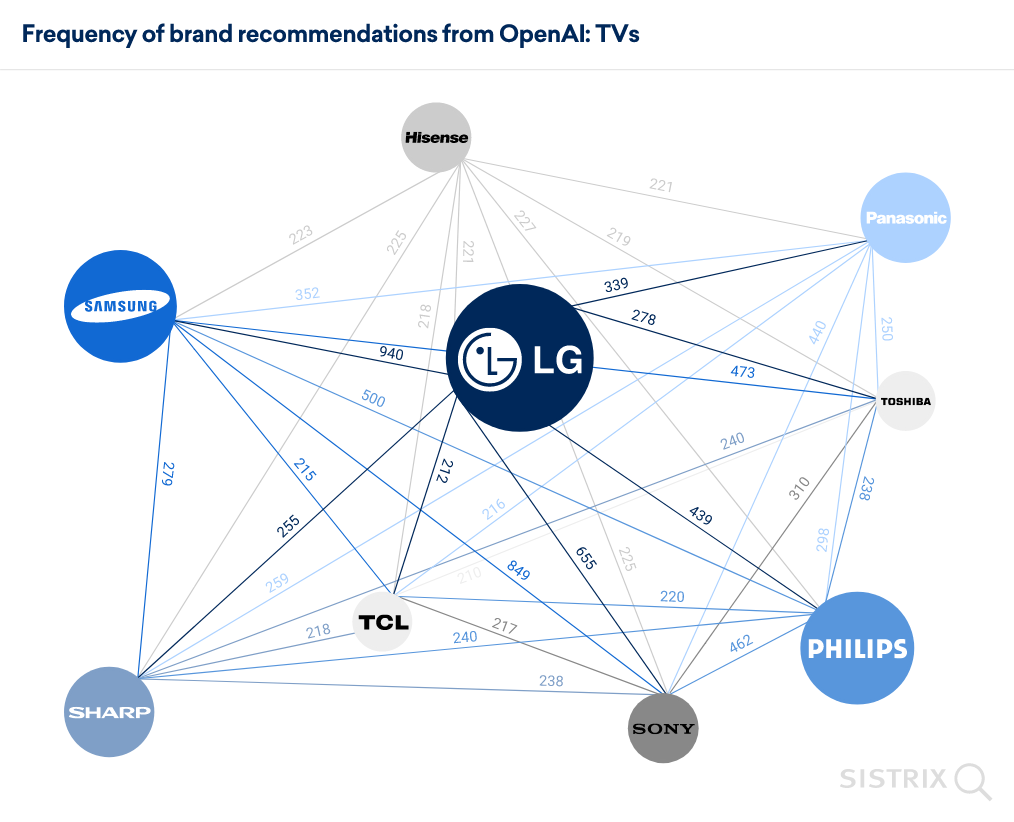
Check out the complete analysis for many other insights, including the list of brands that perform below average and charts of how often certain brands appear.
The next case study is a look at the overall state of search in 2023. It’s a helpful large-scale review of everything that’s changed in a tumultuous couple of years.
The State of Search 2023
https://www.semrush.com/blog/state-of-search-2023/
Marcus Tober brings you this catch-up resource for all the changes in search. His team calculated total traffic trends based on 50,000 US domains. Nearly 150,000,000,000 searches were analyzed to determine the rise and fall of different factors, topics, and terms.
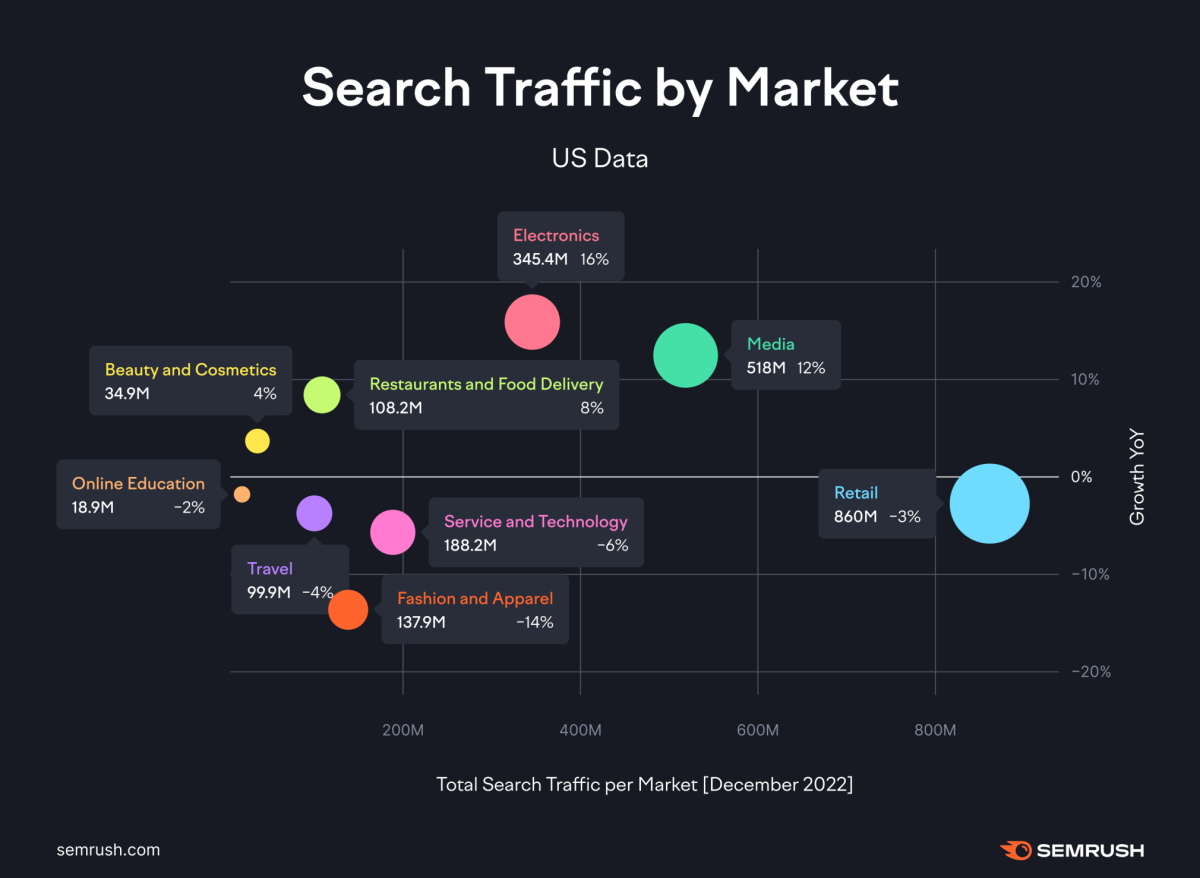
One factor that his team couldn’t ignore was the dramatic increase in Google Search Updates. They tracked how many of these updates landed compared to previous years and how much volatility they caused. For one, they detected that updates are becoming more frequent.
Next, Marcus takes you through the major website tends for the last year. As he notes, there has been a 3-year decline in the number of ranking domains. This may result from Google’s work to stop spam from ranking.
He notes that this also means larger sites rank for more keywords than before. This may suggest a growing advantage for sites with larger budgets and footprints.
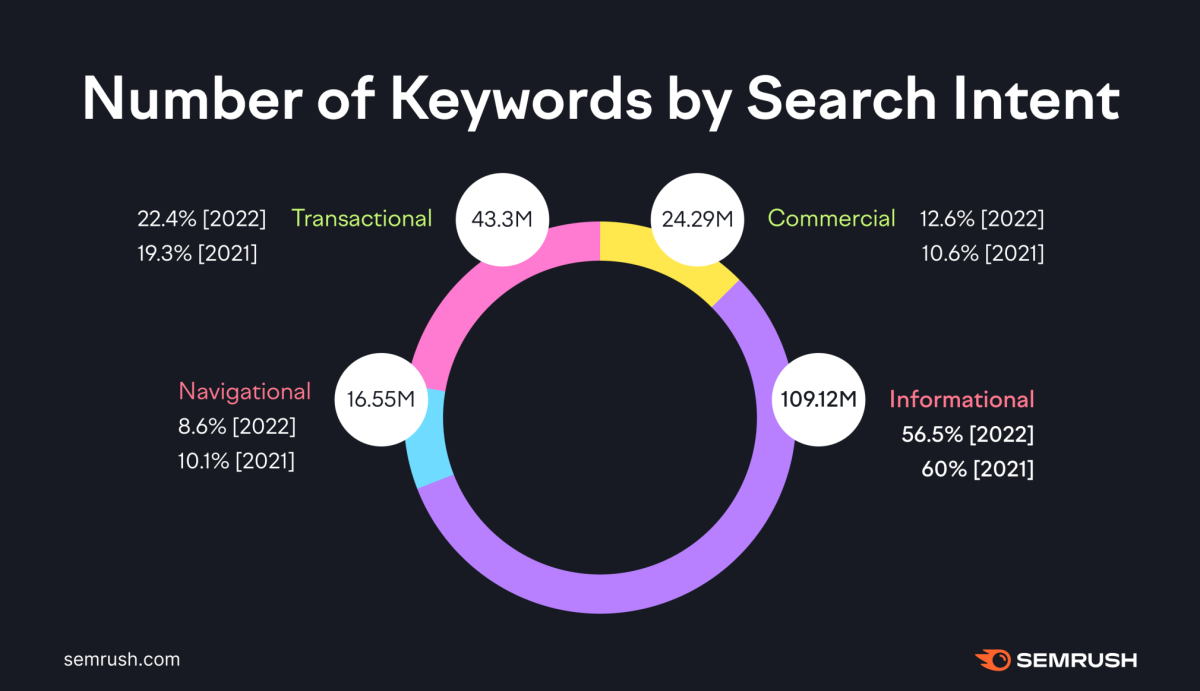
The remainder of the study is a detailed, extended graphic that illustrates most of the covered trends.
You’ll learn more about:
Check out the complete study to catch up on everything that happened over the last year. For now, let’s look to the future. One study predicts that the use of AI will rapidly increase over 2023.
Use of AI for SEO and Content to Grow 5X This Year
https://searchengineland.com/seo-compounding-value-393965
Danny Goodwin brings you these polling results on SEOs and their agencies performed by BrightEdge. He notes that marketing budgets have mostly been holding steady from the start of the COVID crisis. Budgets are expected to grow again, with many investments going toward AI.
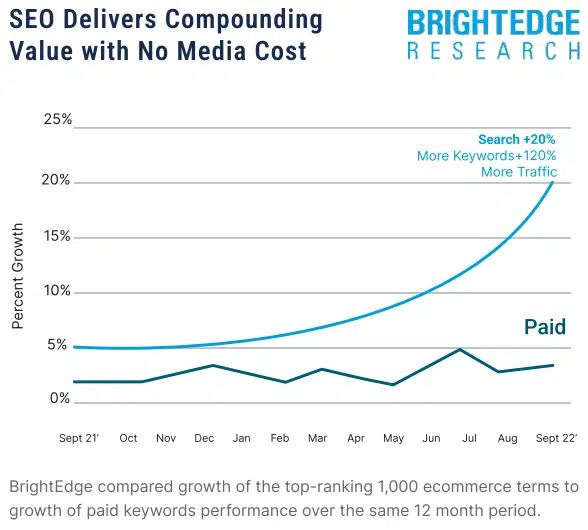
He analyzed the following findings from the study:
Check out Danny’s write-up to get more analysis and a link to the full AI use study. For now, you’re ready to see the latest news.
First, we have an official Google announcement with some important news for SEOs in the “news” niche.
Understanding News Topic Authority
https://developers.google.com/search/blog/2023/05/understanding-news-topic-authority?hl=en
Google has released this guidance in response to the proliferation of news sites and sites that deal with news content. Over the course of the guidance, they explain how topic authority works for these sites and how Google balances a need for accuracy with other concerns.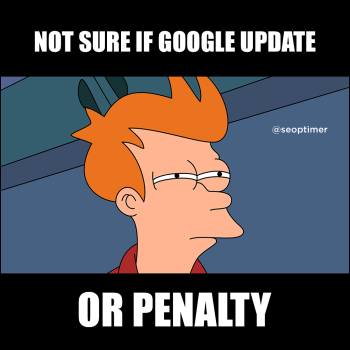
The company partly explains how topical authority works with “news.” Like many niches, this one works on a number of signals that determine how high you can rank.
They include—
This short report should help SEOs in the news niche understand what it takes to succeed in this genre. For now, you’re ready to look at Google’s next report on new AI functions.
Google Unveils Search Upgrades at I/O: Generative AI & ‘Perspectives’
Matt G. Southern brings you a summary of Google’s recent announcement. Google has revealed the first AI-powered search upgrades at the Google I/O. One will add generative AI to search results, and the other is a new “Perspectives” feature.
The new generative AI feature is believed to be able to answer more complex questions and enhance a number of search-related buying decisions with connections to more information.
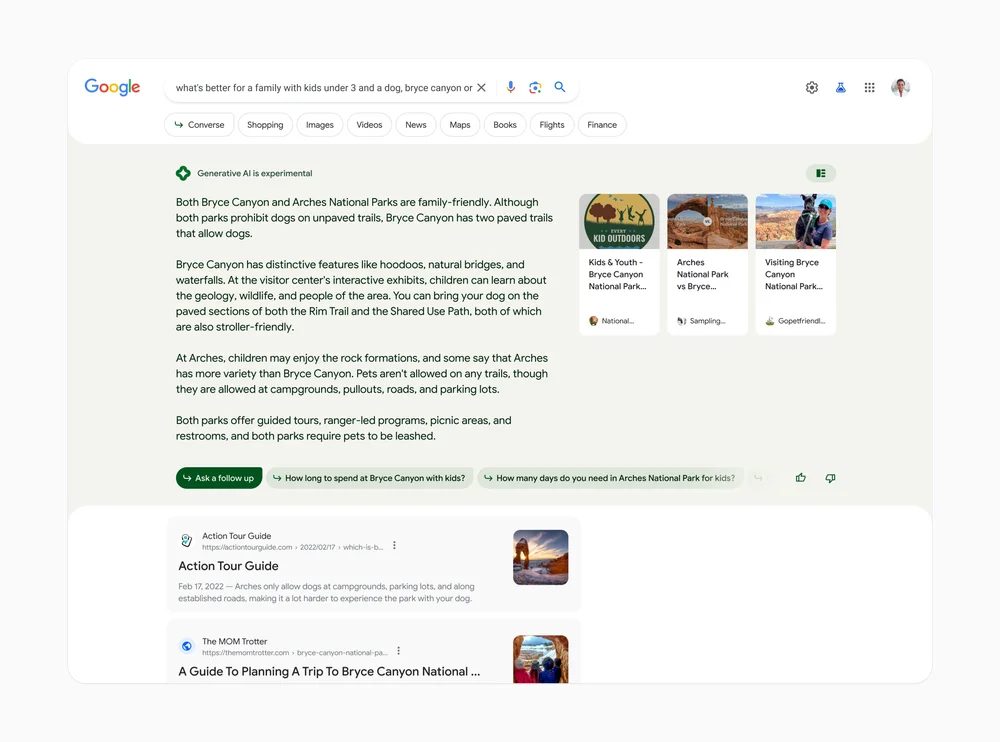
Google announced they had planned a number of safeguards to prevent these features from extending into searches where they could provide dangerous information.
The “Perspectives” feature is a new one that is designed to provide more varied information for results that involve opinions. In demonstrations of the new search feature, operators showed it pulling up a mix of authors and content types.
This is just the first of the new AI features announced for Google Search. Check back regularly for the latest news about AI and other topics.
Got Questions or Comments?
Join the discussion here on Facebook.

